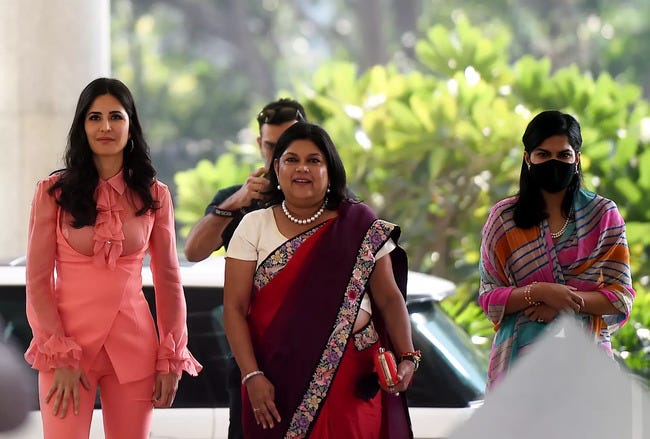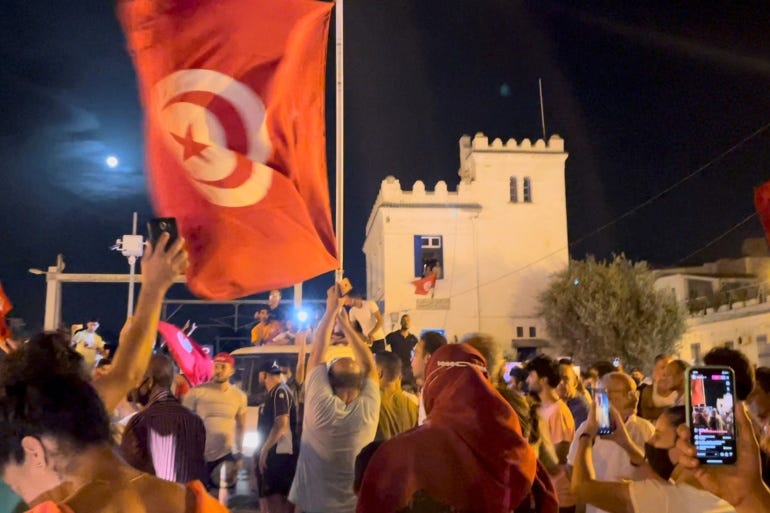Emerging Markets Daily - November 28
New Covid Variant Sparks Global Uncertainty, UAE's Sweeping Reforms, India's Richest Self-Made Woman, El Salvador Buys Bitcoin Dip, Tunisia's Democracy Woes
The Top 5 Stories Shaping Emerging Markets from Global Media - November 28
Markets Face Weeks of Uncertainty with Omicron Virus
Bloomberg
“The fate of global markets now depends at least in part on laboratories around the world probing the omicron Covid-19 strain, potentially leaving investors with weeks of uncertainty in the wait for answers.”
“The variant detected in Africa is described as highly concerning, and has already led to international travel bans. Scientists are analyzing whether it can evade vaccines and how its symptoms differ from current strains.”
“Vaccine maker BioNTech SE expects the first data within two weeks, initial findings that will help to determine if a passing scare or bigger hit to global economic reopening looms.”
“Fearful investors fled stocks worldwide Friday and flocked to havens such as sovereign bonds as volatility spiked. The window for more clarity on omicron to emerge may be two to eight weeks, during which demand for riskier assets could take a hit, according to Citigroup Inc. strategists including Jamie Fahy and Yasmin Younes.” Bloomberg reports.
UAE Enacts Sweeping Legal Reforms, Most Extensive in Country’s History
The National
“President Sheikh Khalifa has formally approved the most extensive legal reforms in the country’s history. Major changes include greater protection of personal data, stronger copyright rules and tackling fake news.”
“More than 40 laws are included. Some are new, while others are updated versions of existing legislation. The updated Federal Crime and Punishment Law, for example, strengthens protection for women and domestic workers.”
“The law also effectively decriminalises consensual relationships outside of marriage and provides that any child conceived as a result of the relationship is acknowledged and will be cared for. This comes into effect on January 2, 2022.”
“Legislation covering the spreading of rumours and fake news, electronic fraud and protecting personal data has also been put into place. Investors and entrepreneurs will be allowed to establish and fully own onshore companies in almost all sectors, with the exception of activities deemed to be ‘strategic’.”
“The changes are the result of efforts by 540 experts from 50 federal and local authorities who worked with more than 100 private-sector organisations for the past five months, Wam said.” The National reports.
Meet Falguni Nayar: India’s Richest Self-Made Female Billionaire
Rest of World
“In early November, Falguni Nayar became India’s richest self-made female billionaire after her company Nykaa, the country’s largest online cosmetics retailer, went public. The initial public offering was oversubscribed more than 80 times, and its shares listed at a 78% premium to the offer price.”
“Nayar, a 58-year-old former investment banker, now has a reported net worth of around $7.7 billion. Her success is an outlier in India’s startup ecosystem — the world’s third-largest — where just five of 136 unicorn founders are women. A 2019 report by the International Finance Corporation ranked India third among 77 countries for the size of gender gaps in business, and found that only 33% of early-stage entrepreneurs in India were female.”
“Women working in the Indian tech sector told Rest of World that they hope Nayar will become the rare role model that young women in the country need. Nupur Hemant, an entrepreneur-turned-venture capitalist, believes Nayar’s success will make women have more faith in their entrepreneurial dreams, and perhaps make investors trust female founders more than they do now.”
“There are many structural barriers for female entrepreneurs in India. Few girls in India are encouraged to pursue STEM subjects, and the gender ratio at India’s elite engineering colleges — which form the foundation of much of tech entrepreneurship in India — is heavily skewed towards men, with fewer than 10% of students at the Indian Institutes of Technology (IITs) being female.”
“Even the women who manage to overcome these barriers struggle to sustain and grow their ventures. Gender bias, taboos, cultural practices, and familial expectations mean that female entrepreneurs are often unable to access financing to support their businesses, said Jyotsna Siddharth, an intersectional activist and country director at feminist knowledge network Gender at Work. In 2020, Mint reported that only three of the top 20 venture capital firms in India — India Quotient, Lightspeed India, and Kalaari Capital — have one woman partner.” Akankshah Singh reports.
El Slavador Buys the Dip, Purchases 100 Bitcoin
Bloomberg
“El Salvador President Nayib Bukele said the Central American country had taken advantage of the 7.7% decline in Bitcoin on Friday to purchase 100 more of the coins. ‘El Salvador just bought the dip,’ Bukele wrote on Twitter, almost a week after he announced the nation’s plan to sell $1 billion in tokenized 10-year dollar-denominated bonds.”
“El Salvador previously bought a total of 1,100 Bitcoin as of Oct. 27. The country made the cryptocurrency legal tender alongside the dollar from Sept. 7. Dollar bonds from El Salvador are among the worst-performing in emerging markets so far this month, lagging only defaulted Lebanese debt, according to data compiled from a Bloomberg index.”
“The selloff in the bonds came as investors weighed the possibility of higher indebtedness in the Central American nation, as well as rising concern it will not reach a deal with the International Monetary Fund.” Bloomberg reports.
In Tunisia, Nostalgia for Better Economic Times Before the Revolution
Financial Times
“Unable to find work, Faouzi Brahmi, a day labourer, plays dominoes with friends in a café in the town of Sidi Bouzid, birthplace of Tunisia’s 2011 revolution. The father of four, whose family lives hand to mouth, said he yearned for the days of Zein al-Abidine Ben Ali, the dictator ousted by the uprising. ‘Life was a lot cheaper then,’ he said. ‘We dreamt of a better future after the revolution, but what came was worse than before.’”
“Sidi Bouzid, capital of a province of the same name in the impoverished interior of Tunisia, is where Mohamed Bouazizi, a young street vendor, set himself on fire in protest against humiliating treatment by municipal officials, sparking an explosion of anger that engulfed the country and toppled Ben Ali.”
“A massive portrait of Bouazizi still covers the facade of the post office building on the main street of Sidi Bouzid. But the townspeople, like most Tunisians, are deeply disillusioned with the past decade of economic deterioration under a string of weak coalition governments which failed to address poverty and unemployment — the grievances that fuelled the revolt.”
“Until July, when Kais Saied, Tunisia’s elected populist president, seized all powers and shuttered parliament, the country was viewed as the only successful democratic transition to have emerged from the revolutions and regional turmoil of 2011.”
“Millions now pin their hopes on Saied, who has yet to articulate an economic policy. He remains popular, even as he suspended the constitution and announced he would rule by decree. His biggest challenge, however, will be delivering the economic salvation expected by a long-suffering population, analysts say.”
“‘We want factories, jobs, investments and a university in Sidi Bouzid,’ said Saied Bakkari, a café owner. ‘I have three siblings, all graduated as English teachers, but they are all unemployed.’ Zuhour Freiji who co-ordinates demonstrations by young graduates to press the government to employ them, has been jobless since 2017 when she left higher education with a degree in videography.” The FT reports.
To join our growing caravan of fellow travelers/subscribers, please join by hitting this button below
"Don’t quit. Suffer now and live the rest of your life a champion." - Muhammad Ali.





